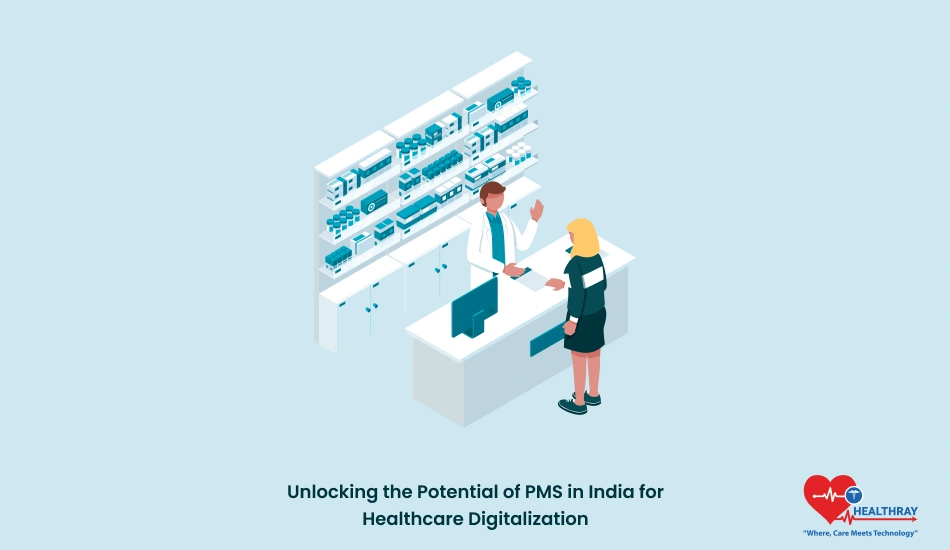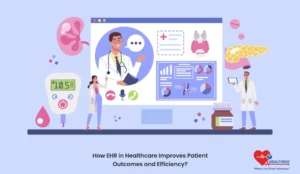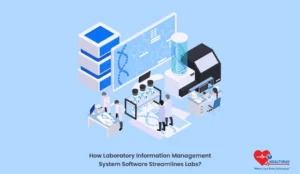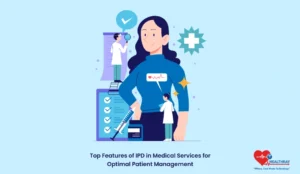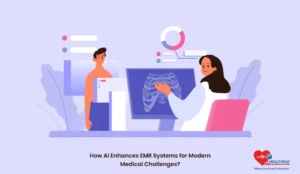Pharmacy Management Software (PMS) has become the backbone of digital transformation in healthcare, especially in India. It streamlines inventory, enhances patient safety, and ensures regulatory compliance. But is PMS just about managing stock, or does it offer a gateway to revolutionizing healthcare delivery?
This post explores how the Pharmacy Management System is not only transforming pharmacy operations but also paving the way for broader healthcare digitalization. We’ll dive into the features of leading systems, the benefits of adopting PMS, and the challenges unique to India’s healthcare ecosystem.
What is Pharmacy Management Software?
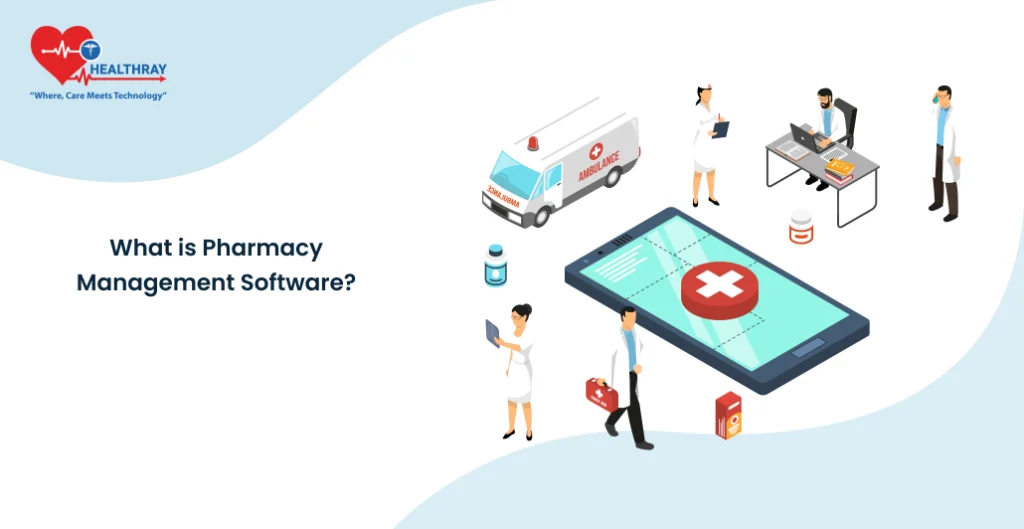
Pharmacy Management Software, or PMS, is a digital tool that automates and streamlines the operations of pharmacies. It helps in inventory management, billing, prescription handling, and regulatory compliance. However, beyond these basics, PMS plays a critical role in improving efficiency and accuracy in pharmacy operations.
Core Features of PMS:
- Inventory Tracking: Automates stock updates, minimizing the risk of shortages or overstocking.
- Prescription Management: Ensures accurate dispensing of medications by integrating digital prescriptions.
- Billing and Payments: Simplifies payment processes with integrated billing systems and GST compliance.
- Regulatory Compliance: Keeps records aligned with local regulations, reducing compliance risks.
- Analytics and Reporting: Offers insights on sales, inventory trends, and customer behavior.
Why is PMS Important for Healthcare Digitalization?
As healthcare becomes more data-driven, PMS provides a basis for pharmacy integration into larger healthcare networks. It allows for real-time data sharing between pharmacies, hospitals, and healthcare providers, thus enhancing patient care and operational transparency.
This is the foundation that will make digital healthcare systems efficient, accurate, and patient-focused.
The Role of PMS in Healthcare Digitalization
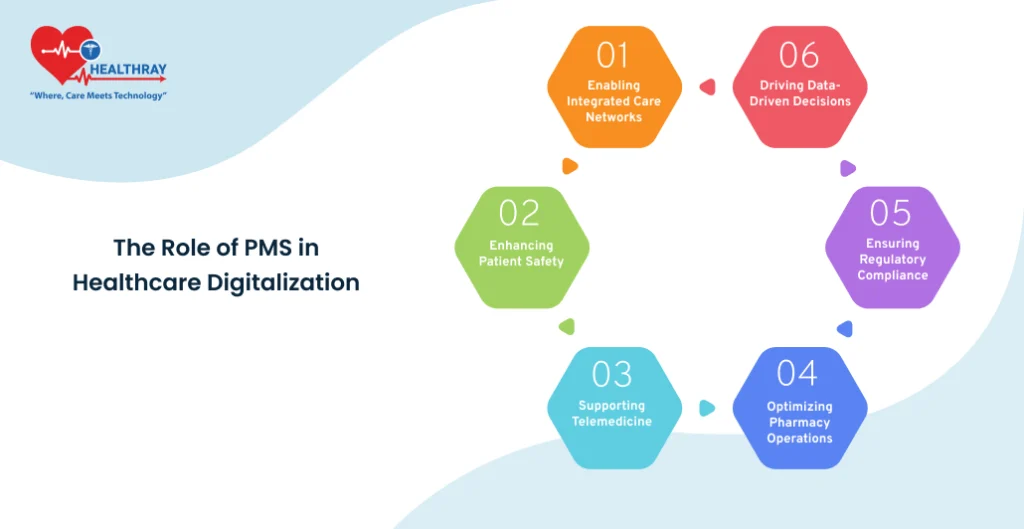
From basic inventory management, Pharmacy Management Software, or PMS has today become an important piece of the digitalization of health chains. This is significant as health care is a problem different for India due to higher loads on patients and fragmented care systems.
Enabling Integrated Care Networks
PMS connects pharmacies with hospitals, clinics, and diagnostic centers. It enables easy sharing of data and always provides the records of the patient, prescriptions, and medical histories. This eliminates errors and ensures the continuity of care.
Enhancing Patient Safety
One of the major concerns in health care is medication errors. PMS addresses this issue by integrating prescription validation systems, ensuring that the correct drug is dispensed with the right dosage. It can be further enhanced to include alerts for drug interactions or allergies.
Supporting Telemedicine
With the rapid growth of telemedicine in India, PMS has become an important component. Patients can now receive digital prescriptions, and pharmacies that are equipped with PMS can process such prescriptions immediately, thereby facilitating the rapidly increasing demand for remote healthcare services.
Optimizing Pharmacy Operations
PMS can remove many repetitive tasks that consume time, such as restocking and stock counts for the pharmacist to care more about the patient. More important features include real-time stock inventory updates, making a hospital pharmacy better at managing available resources.
Ensuring Regulatory Compliance
Indian healthcare regulations are stern, especially when it comes to dispensing and sales of drugs. PMS automates compliance tasks like record-keeping and tax filling, which reduces the risk of any legal complications.
Driving Data-Driven Decisions
Pharmacies collect a lot of data. PMS organizes that data into actionable insights for the pharmacy and healthcare provider to make informed decisions for improvement in service delivery.
Key Benefits of PMS for Hospital Administrators, Software Providers, and Policymakers
Pharmacy Management Software (PMS) gives unique benefits to each actor in the healthcare ecosystem. Take a closer look at how PMS addresses the needs of hospital administrators, software developers, and policymakers:
For Hospital Administrators
- Streamlined Operations
PMS automatically manages the inventory, prescriptions, and billing. It reduces manual errors and helps in efficiency within the hospital pharmacies. - Cost Control
It prevents overbuying and reduces waste, thus enabling the hospitals to manage their budget effectively. - Enhanced Patient Experience
When PMS is integrated into the hospital system, the patients can experience faster service, accurate medication dispensing, and fewer delays.
For Healthcare Software Providers
- Market Opportunity
The rising demand for digital tools in healthcare makes PMS a lucrative segment for software providers. Offering customizable solutions tailored to Indian regulations gives providers a competitive edge. - Scalability and Integration
PMS solutions can be designed to integrate seamlessly with electronic health records (EHRs) and other hospital systems, enhancing their value proposition. - Driving Innovation
Software providers can use Hospital Pharmacy Management as a platform to introduce features like AI-driven analytics, telemedicine support, and predictive inventory management.
For Policymakers
- Better Regulation and Oversight
PMS provides detailed records of drug sales, prescriptions, and inventory. This data helps regulatory bodies track compliance and combat counterfeit medicines. - Improved Public Health Data
Aggregated data from PMS across pharmacies can inform public health initiatives, track disease trends, and optimize drug supply chains. - Promoting Healthcare Digitalization
Encouraging the adoption of PMS aligns with India’s goals for a more connected and efficient healthcare system. Policymakers can incentivize adoption through subsidies, training programs, or tax benefits.
Challenges in Implementing PMS in India
Pharmacy management software has potential, yet its adoption in India does not come without its barriers. Removing these barriers will be significant so that PMS can widely be adopted and implemented into the market.
Cost Concerns
- Initial Investment: Many smaller pharmacies and healthcare facilities struggle to afford the upfront cost of PMS software and necessary hardware. This issue is particularly acute in rural areas where profit margins are thin.
- Ongoing Expenses: Maintenance costs, software upgrades, and training can add to the financial burden, discouraging adoption.
Resistance to Change
- Lack of Awareness: Many pharmacy operators, especially in independent settings, are unaware of the benefits PMS can bring to their operations.
- Cultural Hesitation: A significant portion of pharmacists and healthcare professionals prefer manual systems due to familiarity, fearing the complexity of digital tools.
Limited Digital Infrastructure
- Connectivity Issues: Many parts of India still lack reliable internet access, making cloud-based PMS solutions difficult to implement.
- Hardware Availability: Pharmacies in rural or semi-urban areas often lack the necessary hardware, such as barcode scanners or point-of-sale (POS) systems, to fully utilize PMS.
Data Security and Privacy
- Regulatory Compliance: Ensuring that PMS complies with data privacy laws such as the Personal Data Protection Bill can be challenging for software providers.
- Cybersecurity Risks: As PMS systems store sensitive patient and pharmacy data, they are potential targets for cyberattacks, requiring robust security measures.
Integration Challenges
- Compatibility Issues: Many existing hospital and pharmacy systems were not designed for integration with PMS, requiring additional investments to bridge the gap.
- Fragmented Ecosystem: The healthcare sector in India is highly fragmented, which complicates the implementation of a unified digital infrastructure.
Training and Support
- Skill Gaps: Many pharmacy staff lack the technical skills to operate PMS effectively, necessitating comprehensive training programs.
- Lack of Support: Smaller software providers may struggle to offer consistent after-sales support, leaving pharmacies unable to resolve technical issues promptly.
Future Prospects of PMS in India’s Healthcare Digitalization
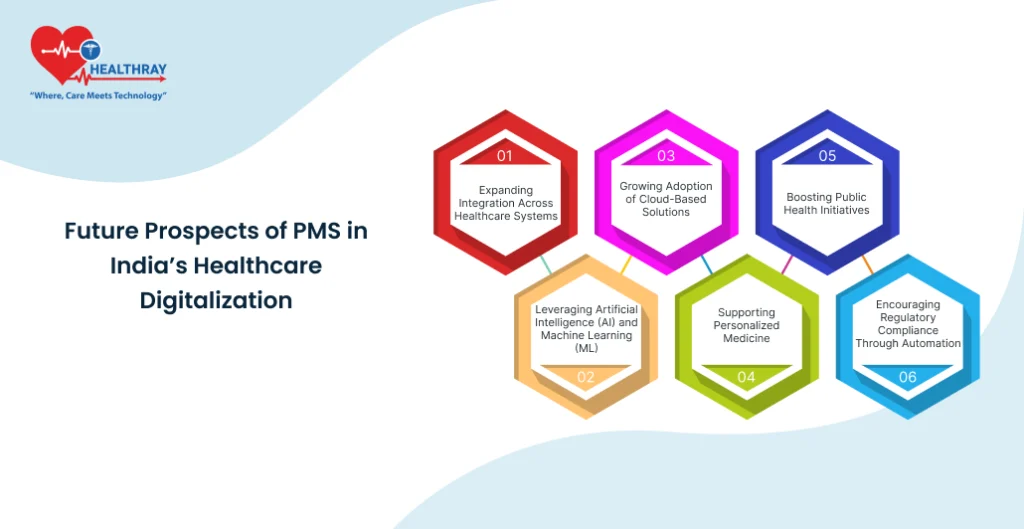
Pharmacy Management Software (PMS) is going to be one of the stalwarts of India’s overall digitalization journey in its healthcare segment. With the technology advancing and the adoption rates of digital tools increasing, this can really transform not just pharmacy operations but the ecosystem of health care as such.
Expanding Integration Across Healthcare Systems
As hospitals, diagnostic centers, and telemedicine platforms become more integrated, PMS will be at the center of unifying these systems. EHRs, teleconsultation platforms, and insurance providers will all be integrated into a seamless healthcare experience for patients.
Leveraging Artificial Intelligence (AI) and Machine Learning (ML)
The future for PMS is predictive analytics and AI-driven insights-forecasting inventory needs, providing the best possible optimization within supply chains, identifying looming drug shortages, and preventing harmful drug interactions that result in patient harm.
Growing Adoption of Cloud-Based Solutions
Cloud-based PMS platforms are gaining more popularity these days because they are scalable, affordable, and accessible. It does away with heavy capital investment in hardware and assures data availability from anywhere. This suits India’s vast geography.
Supporting Personalized Medicine
With the increasing focus on personalized medicine, PMS can play a key role by maintaining detailed patient profiles. This data allows pharmacists to tailor medications and dosages based on individual needs, enhancing treatment outcomes.
Boosting Public Health Initiatives
Aggregated data from PMS systems can provide invaluable insights for public health planning. Policymakers can use this data to identify disease trends, monitor drug utilization, and optimize resource allocation during health crises.
Encouraging Regulatory Compliance Through Automation
Future PMS platforms will likely include advanced compliance tools to align with evolving healthcare regulations. Automation of record-keeping and reporting will simplify adherence to laws and reduce the administrative burden on pharmacies.
Conclusion
Pharmacy Management Software (PMS) is not only a tool for streamlining pharmacy operations but also a critical building block for healthcare digitalization in India. With automation, improved patient safety, and integration with larger healthcare systems, PMS offers immense potential to transform how pharmacies and hospitals operate.
For hospital administrators, PMS means greater efficiency and cost savings. For Hospital Management System software providers, it’s a growing market filled with opportunities for innovation. For policymakers, PMS helps strengthen regulatory compliance and provides actionable data for public health initiatives.
There are challenges on the road ahead, including cost barriers, limited digital infrastructure, and training gaps. However, through collaborative efforts and technological advancements, PMS can become a cornerstone of India’s healthcare ecosystem. The future of healthcare digitalization is bright, and PMS is set to play a leading role in this transformation.
